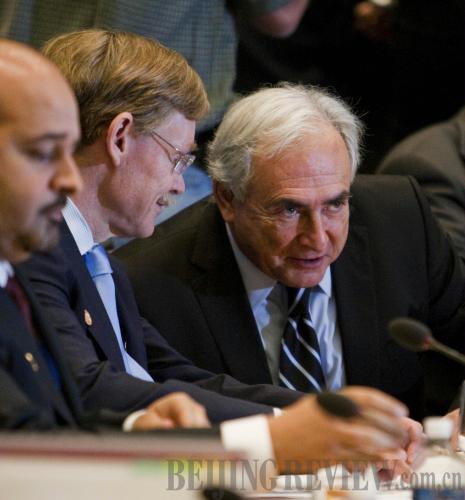|
 |
|
PASSING REFORM: Robert Zoellick (middle), World Bank Group President, and Dominique Strauss-Kahn (right), IMF Managing Director, talk during a joint meeting of the two organizations in Washington, D.C. on April 25 (ZHU WEI) |
The World Bank granted greater voting power to China and other developing countries, marking a significant milestone in its structural reform.
At the joint Development Committee meeting of the World Bank and International Monetary Fund (IMF) held April 24-25 in Washington, D.C., a plan was endorsed to increase the developing and transition countries' voting power in the International Bank for Reconstruction and Development (IBRD) by 3.13 percentage points to 47.19 percent. The IBRD is the original institution of the World Bank Group and normally represents the group.
This increase fulfills the bank's Development Committee commitment in Istanbul in October 2009 to generate a significant increase of at least 3 percentage points in developing and transition countries' voting power.
Under the plan, China's voting power will be increased to 4.42 percent from 2.77 percent, the third largest in the 186-nation anti-poverty lender. Brazil's voting power also increased from 2.06 percent to 2.24 percent, and India from 2.77 to 2.91 percent.
The United States, the world's largest economy, remains the major stakeholder at 15.85 percent, effectively giving it veto power, followed by Japan at 6.84 percent.
The change in voting power better reflects the realities of a new multi-polar global economy where developing countries are becoming key global players. In a period when multilateral agreements between developed and developing countries have proved elusive, this accord is all the more significant, said World Bank Group President Robert Zoellick.
"This shift has been agreed by our shareholders. They try to recognize the change in the world economy and include the contribution to the development in the methods, which can encourage developing countries in transition," Zoellick told Xinhua News Agency. "We were just pleased that we are getting close to reflecting China's increasing share in the world economy."
U.S. Treasury Secretary Timothy Geithner also welcomed the shift. "The new formula will better reflect the weight of the developing and transition countries in the global economy, while protecting the voice of the smallest and poorest countries." he said. "Because we believe this overall outcome merits our strong endorsement, the United States agreed not to take up its full shareholding in this new arrangement."
In addition, member countries also agreed to a capital boost—the first time in 20 years—of $86.2 billion for the IBRD to make up for the lending spree by the bank in the midst of the financial crisis.
By increasing its legitimacy through voice reform and rebuilding its capacity through the capital increase, the World Bank will strengthen its efficiency, effectiveness and accountability, said the bank in a communiqué issued at the end of the meeting.
China's role
Developing countries have long pushed for an end to the dominance of the United States and Europe in the World Bank decision-making process. Since its founding in 1945, America has monopolized the World Bank presidency, while Europe has led the IMF.
But the dynamics are obviously set to change. While developed countries continue to buckle under the strains of recessions, many emerging economies have already effectively restarted their growth engines. China, in particular, has steered a steady course through the financial crisis.
Meanwhile, Chinese voices are increasingly being heard at international financial institutions. In February 2008 Justin Yifu Lin, former Director of the China Center for Economic Research at Peking University, was appointed chief economist of the World Bank. In another move, Zhu Min, former Vice Governor of the People's Bank of China, the central bank, will take office as special advisor of the IMF in May.
But more power means greater responsibility, said Sun Lijian, an economics professor at the Shanghai-based Fudan University.
In return for World Bank representation, China will be required to play a bigger role in world economic affairs and may face heavier pressure from the West on global issues like trade imbalances, said Sun.
Li Kui-wai, Director of the Hong Kong APEC Study Center, agreed. It is not enough for China to focus on only the domestic economy—the country will be more obliged to help others through the World Bank, he said.
In past decades, the World Bank committed enormous financing to infrastructure construction in China. Now, it is time for China to show its gratitude and help other nations, Li said.
Minister of Finance Xie Xuren said on the sidelines of the meeting that China would strengthen its efforts in global economic development and poverty reduction in a closer tie-up with the World Bank.
The shift in voice and voting power puts governance of the bank on a more reasonable and fairer footing, and allows the developing world to have a bigger say in World Bank policy-making, said Xie.
It also lays a solid groundwork for deeper reform of the bank that aims to achieve the ultimate goal of equitable voting power between developing and developed members, Xie said. Besides this, it sets a good example for other institutions, like the IMF, to proceed with voting reform, he added.
"The severe under-representation of developing countries in the IMF seriously affects the fund's legitimacy and effectiveness, and there is an urgent need to address the problem," said central bank governor Zhou Xiaochuan at the meeting.
| 